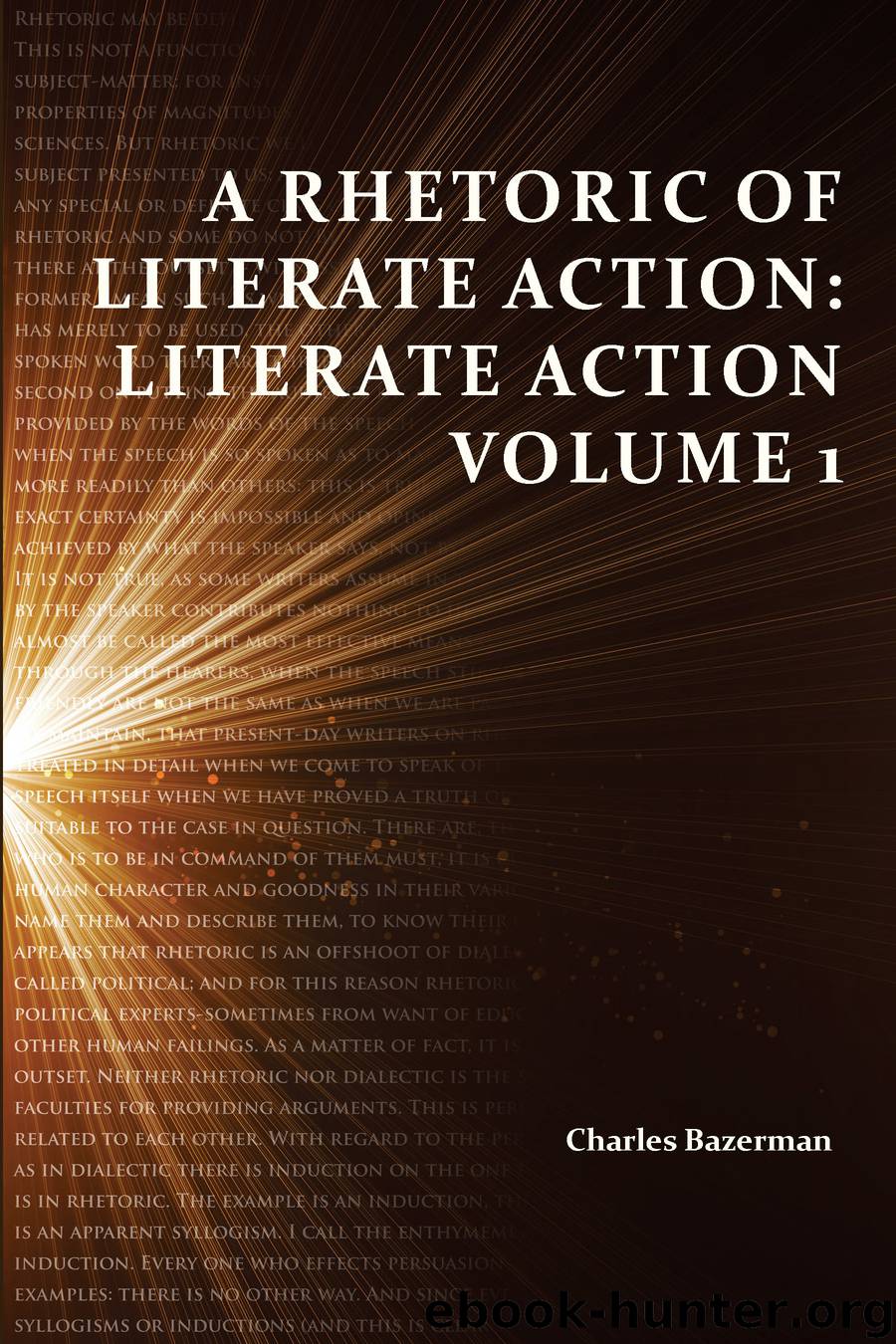A Rhetoric of Literate Action: Literate Action Volume 1 by Charles Bazerman

Author:Charles Bazerman
Language: eng
Format: epub
Tags: Rhetoric, Literacies, Writing Studies, Composition
Publisher: The WAC Clearinghouse and Parlor Press
Published: 2015-11-06T16:00:00+00:00
Chapter 7. Text Strategics
Traditional views of rhetoric have identified the key strategic action to be accomplished as persuasion—that is to bring the audience to agreement with the speaker’s view or position. Such a strategic goal is appropriate to the arenas of judicial, parliamentary, and political decision within which rhetoric developed, and even to the arena of spiritual conversion and homiletics (to which rhetoric became extended in the early Christian period). When the goal is persuasion, the main vehicle is argument, to turn other minds in the desired direction.
However, the view presented in this book suggests a range of strategic written actions that may be accomplished in many arenas of activity, unfolding over time rather than in single moments of decision. A broader way of characterizing the goal of rhetoric is influence rather than persuasion. Influence only requires that other people act in some way that recognizes or responds to your utterance. A geologist need not have any degree of disagreement with another person to influence them by providing a detailed report on geologic stresses along a fault so that you can together estimate current risks. Nor does a homeowner need to argue with other neighborhood homeowners in a series of emails coordinating an annual clean-up drive that all are committed to by long-standing practice. The communicative work in either case is not to persuade someone to something they would not already have acceded to. The influence is to create conditions for successful outcomes by providing information or coordinating schedules.
In other cases, it may be that the desired influence is not to create agreement, but to create further divisions and differences with the interlocutor. A businessperson may wish to identify exactly where her concerns and interests differ from a business partner, so that they can renegotiate the terms of the agreement. People may wish to detail the idiosyncratic particulars of their lives, experiences, and emotions so that they may understand each other better or just enjoy sharing unusual events and perspectives. In a contentious situation a statement can be for the benefit of third parties to understand the choice they have in adopting different views or can be to instigate an opponent to an extreme action or statement. Influence is as various as human activities and the ways we have of participating in them so as to somehow affect the outcome. So to think strategically about writing, we need to be considering what outcome we are looking for and how our writing may help bring that about.
Even within the traditional realms of political deliberation sometimes the most effective writing actions are not those aimed overtly at persuasion, as anyone who has written an agenda for a committee is aware. The most effective action may not be to bring powerful arguments and evidence to a meeting, but to allow or disallow an item coming to a vote or to shape the form of the proposition to be voted on. At times even more powerful is to write the agenda so that before
Download
This site does not store any files on its server. We only index and link to content provided by other sites. Please contact the content providers to delete copyright contents if any and email us, we'll remove relevant links or contents immediately.
Cecilia; Or, Memoirs of an Heiress — Volume 1 by Fanny Burney(32546)
Cecilia; Or, Memoirs of an Heiress — Volume 2 by Fanny Burney(31943)
Cecilia; Or, Memoirs of an Heiress — Volume 3 by Fanny Burney(31929)
The Lost Art of Listening by Michael P. Nichols(7492)
Asking the Right Questions: A Guide to Critical Thinking by M. Neil Browne & Stuart M. Keeley(5758)
We Need to Talk by Celeste Headlee(5608)
On Writing A Memoir of the Craft by Stephen King(4935)
Dialogue by Robert McKee(4389)
Pre-Suasion: A Revolutionary Way to Influence and Persuade by Robert Cialdini(4221)
I Have Something to Say: Mastering the Art of Public Speaking in an Age of Disconnection by John Bowe(3872)
Elements of Style 2017 by Richard De A'Morelli(3339)
The Book of Human Emotions by Tiffany Watt Smith(3300)
Fluent Forever: How to Learn Any Language Fast and Never Forget It by Gabriel Wyner(3077)
Name Book, The: Over 10,000 Names--Their Meanings, Origins, and Spiritual Significance by Astoria Dorothy(2978)
Why I Write by George Orwell(2944)
Good Humor, Bad Taste: A Sociology of the Joke by Kuipers Giselinde(2941)
The Art Of Deception by Kevin Mitnick(2796)
The Grammaring Guide to English Grammar with Exercises by Péter Simon(2740)
Ancient Worlds by Michael Scott(2682)
